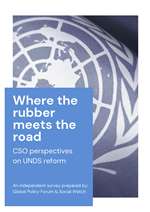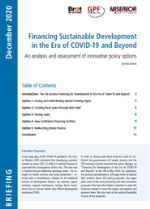Published on Mon, 2021-02-01 14:24
A survey among CSOs in “programme countries” evidences a very high level of commitment to UN values and principles, much dissatisfaction with the actual operations at country level and articulation of areas for improvement. For a number of CSOs, the UN system is appreciated for its inspiration, legitimization and promotion of the values they stand for, but is also viewed as a competitor for funds and influence, often displacing the social sector instead of building it. And frequently it is seen as both at the same time. |
Published on Wed, 2020-12-09 13:35
An analysis and assessment of innovative policy options In the early days of the COVID-19 pandemic, the United Nations (UN) estimated that developing countries needed an extra US$ 2.5 trillion in external finance to cope with the consequences of the crisis. This vast sum is needed because additional spending needs – for example on health services and social protection – coincide with a simultaneous collapse of all traditional sources of development finance: tax revenue, export earnings, migrant remittances, foreign direct investment and, to a lesser extent, also official development assistance (ODA). In order to discuss how these finances could be mobilized, the governments of Canada, Jamaica and the UN Secretary-General launched the policy dialogue on “Financing for Development in the Era of COVID-19 and Beyond” at the UN in May 2020. |
Published on Thu, 2020-12-03 19:54
The General Assembly (GA) will host its 31st Special session in response to the coronavirus disease (COVID-19) pandemic on 3 and 4 December 2020. The UN Charter (Chapter IV, article 20) provides for the General Assembly to meet in special sessions which can be "convoked by the Secretary-General at the request of the Security Council or of a majority of the Members of the United Nations." UN special sessions are unusual, this will be 31st in the life of the UN and only the sixth since 2000. As the COVID-19 pandemic’s widespread effects range across development, peace, security, and socioeconomic affairs, there is no doubt about the special measures that the global community must address to confront the global pandemic. |
Published on Wed, 2020-12-02 00:00
The COVID-19 pandemic has resulted in the Least Developed Countries (LDCs) this year experiencing their worst economic performance in 30 years, the United Nations Conference on Trade and Development (UNCTAD) has said. In its Least Developed Countries Report 2020, released on 3 December, UNCTAD said that while the pandemic had (at least initially) a less-than-catastrophic health impact on the LDCs, its economic repercussions have been ruinous. In 2020, the COVID-19 pandemic led to LDC economies experiencing their strongest economic shock in several decades. |
Published on Wed, 2020-11-18 14:27
The Least Developed Countries (LDCs) have been hit hard by the decline in world trade triggered by the COVID-19 pandemic, with the value of LDC merchandise exports falling by 16% during the first half of 2020, the World Trade Organization has said. In a report to a meeting of the WTO Sub-Committee on LDCs last week (WT/COMTD/LDC/W/68), the WTO Secretariat said that data from 97 economies, which include most of LDCs' key trading partners, show that the value of LDC merchandise exports dropped by 21% during March-June 2020 year-on-year. |
SUSCRIBE TO OUR NEWSLETTER






